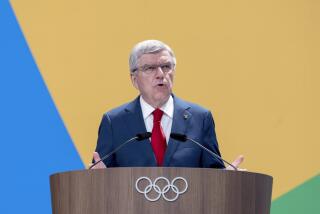Swiss Decisively Spurn U.N. Membership
- Share via
GENEVA — Switzerland voted overwhelmingly Sunday to reject a government proposal that the country should at last join the United Nations, 41 years after its founding.
Not one of the country’s 26 cantons (states) came out in favor of U.N. membership, and the vote in the referendum was 75.7% against joining. With a 50.2% voter turnout, the vote was 1,591,428 against to 511,548 in favor.
Even the canton of Geneva, which has an income of about $600 million a year from the U.N. European headquarters, produced a 70% negative vote. For a referendum to carry in Switzerland there has to be a majority of both the voters and the cantons.
Both houses of the Swiss Parliament had approved the proposal to join the United Nations, and government ministers, led by Foreign Minister Pierre Aubert, campaigned hard to persuade the country that its 170 years of neutrality would not be compromised by membership in the world body. Switzerland already belongs to most of the specialized agencies and subsidiary organizations of the United Nations.
But the country said no to the government by a 3-to-1 majority that was far larger than had been expected. Even though the referendum had never been given much of a chance of succeeding, proponents of U.N. membership had hoped that the margin of defeat would be no more than 55%, so that another try could be made again in five or six years. But the defeat was so crushing, this is now unlikely.
Aubert said after the results were known that the decision “means having disadvantages that one can hardly compensate for.” But he added that the government respects the will--”freely expressed”--of the people. He reiterated the key elements in Switzerland’s foreign policy--”perpetual armed neutrality” and “universality in our foreign policy.”
‘Enormous Victory
Otto Fischer, a conservative member of Parliament who led one of the biggest groups campaigning against membership, called the outcome “totally delightful” and added, “We have won such an enormous victory that it will be many, many years before they government tries again.”
Swiss neutrality was enshrined by the European states at the Congress of Vienna in 1815, following the Napoleonic Wars. But Switzerland did join the old League of Nations after it settled on the shores of Lake Geneva in 1920, with a special provision that its policy of “perpetual neutrality” would not be compromised.
This was the formula that the Swiss government had hoped to repeat this time, but there was nothing much in the record of the League of Nations to encourage the Swiss to come out of their shell and have another try.
In particular the Swiss could see themselves having to take sides in superpower votes and arguments at the United Nations that they would prefer to avoid.
The country is content with membership in just about every other important international organization--the World Health Organization, General Agreement on Trade and Tariffs, U.N. Educational, Scientific and Cultural Organization, the International Atomic Energy Agency, International Labor Organization to name a few. Some of the U.N. agencies are headed by Swiss nationals.
More important to Switzerland than the United Nations is the International Red Cross, which is also headquartered in Geneva and is headed by a Swiss. Many voters felt that the Red Cross would be compromised if the country joined the United Nations.
More to Read
Sign up for Essential California
The most important California stories and recommendations in your inbox every morning.
You may occasionally receive promotional content from the Los Angeles Times.










